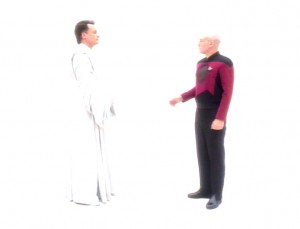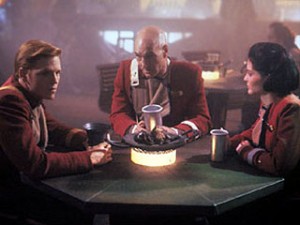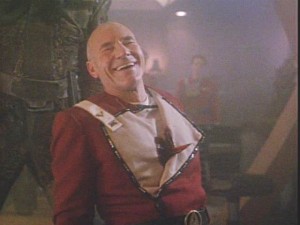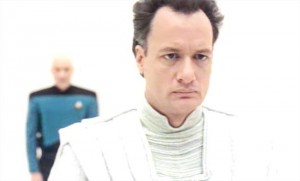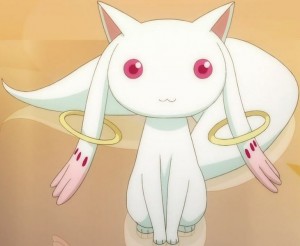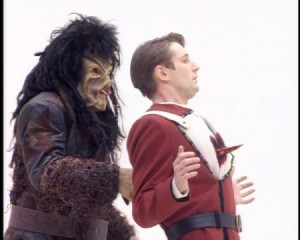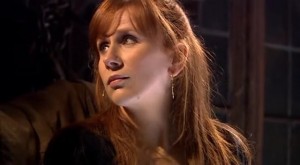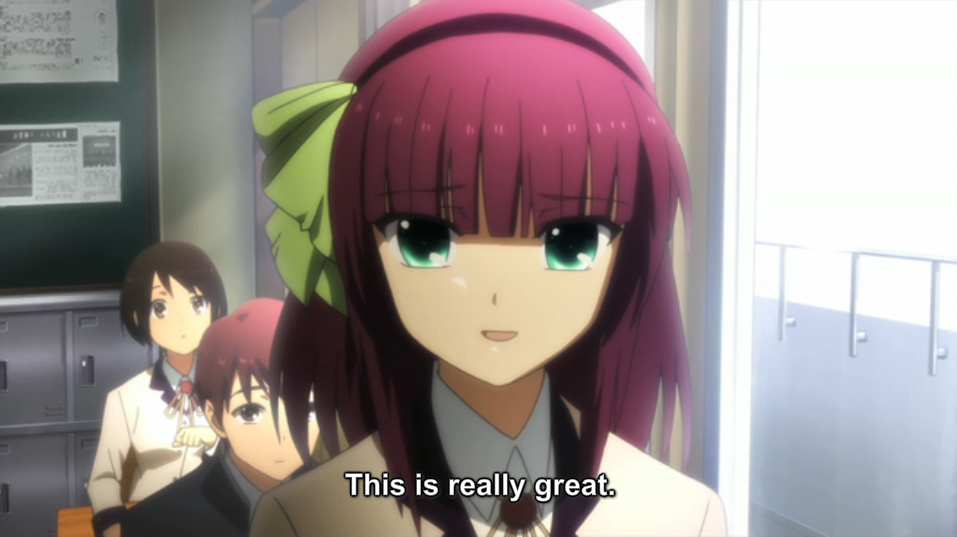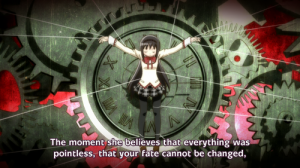This is the eighth entry in my “Top Ten Star Trek: The Next Generation” episodes.
Jean-Luc Picard: Q. what is going on?
Q: I told you. You’re dead. This is the afterlife. And I’m God.
Jean-Luc Picard: No… I am not dead. Because I refuse to believe that the afterlife is run by you. The universe is not so badly designed.
Introduction
“Tapestry” is “It’s a Wonderful Life”, TNG-style, except, instead of having an incompetent, bumbling guardian angel you are stuck with a psychopathic trickster with God-like powers. This has already gotten better.
This episode explores the idea that there are pivotal moments in your life that set you on a path irreparably. In Doctor Who, The Doctor refers to these as “fixed moments in time.” He couldn’t stop the destruction of Pompeii because it was a fixed moment in time. He could, however, save one family from the fires and then regenerate into the father of that family in 2014.
Picard is being given the chance to go back and change that fixed point in time. He regretted what choices he made in that instance and he has a chance to go back, putting things right that once went wrong and hoping each time that his next leap will be the leap home. Oh wait, wrong Enterprise captain.
Jean-Luc Picard
Jean-Luc Picard is one of my absolute, all-time favorite characters in anything. I have said before that I feel like Picard is the mentor/boss/father figure everyone wishes they had. He commands respect, but he still has a sense of humor.
One reason he is such a compelling character is because he has made mistakes. In “The First Duty” he and Boothby talk about some mistake he made as a cadet that is never elaborated on. He talks about how he was a thoughtless and reckless young man. Making mistakes as a young man formed the wise man we see today.
There is so much emphasis in our society on prodigies. We are enamored with the idea of people who have preternatural gifts that allow them to effortlessly float through problems most people find difficult.
We do not fundamentally respect experience. If someone fails at something, we write them off and never give them another chance again. This is not a good attitude to have. Failure is one of the best teachers there is. We do not allow people in our society to fail. Everyone gets a ribbon in the science fair. Everyone is special, which is the same as saying no one is.
I have had my fair share of failures in my life. Each and every one of them taught me something. One reason this episode spoke so much to me was because I have thought about if I was given the chance to go back in time and change one of my fixed points in time if I would. I would not. If I went back and changed anything, it would just delay the inevitable. I would have not learned the lesson I needed to from that failure and I would have had it later when it was harder to recover from.
I don’t necessarily buy that Picard would have become a science lieutenant if he hadn’t been stabbed, but it did get the point across to Picard that these mistakes were part of the tapestry of his life. His mistakes were woven into the fabric of who he is and if you pull one thread the whole piece comes unravelled.
Q
Q is one of the best characters in Star Trek and this is one of the best episodes he appears in.
When we are introduced to Q in “Encounter at Farpoint” he is putting humanity on trial. He decided that we were not ready to interact with the larger universe. We had to prove to him that we were.
All of the best Q stories come from this base idea. I think some of the writers don’t fundamentally understand the kernel of Q’s essence, as evidenced by the abortion they did to the character in his appearances on Voyager.
Q is compelling because he challenges the nature of who we are. He has God-like powers, but they are best used when he forces you into a situation you are uncomfortable with and forces a change on you.
The silly Q episodes like “Q-Pid” could have just as easily been holodeck episodes.
Each race on Star Trek that has become successful represents some aspect of humanity reflected back at us in a way that we can explore it. The Ferengi were a failed race until Deep Space Nine when they figure out that what made the Ferengi tick was capitalism. This was a deep and rich vein to be mined for stories and it is rather painful to go back and see episodes of TNG before they figured that out.
Q and the Q Continuum, to me at least, represent our collective unconscious. I mean that in our feel that there are things that are larger and greater than we are. We are fundamentally all connected and we have stories and themes that universally speak to all of us. There are dark aspects of ourselves that we do not like to examine. Q forces those aspects out into the light and makes you deal with them. Picard worries that he flew too close to the sun and will burn himself out early because he wasn’t more prudent as a young man. Q forces him to confront that fear and to realize that just being alive isn’t the same as living.
Picard inadvertently made something of a Faustian bargain. He traded some of the end of his life for distinction and success earlier on. Generally in fiction Faustian bargains are portrayed as bad or evil. People trade their lives for power, power corrupts, and they descend into a personal hell.
In Puella Magi Madoka Magica Kyubey convinces people to enter into Faustian bargains with it. There is a discussion on the morality of what it is doing. It says that these bargains push the human race forward. If it didn’t create these contracts, the human race would still be sitting around naked in caves.
Not everyone can play it safe. You need people like Steve Jobs to take risks and push us forward. Being one of those people may or may not shorten your life, but we need people to take risks, fall on their face, and get up and keep moving forward.
Live fast, die young, and leave a beautiful corpse.
The Cost of Living
I often think about quality of life. I know a lot of people who are commodity programmers at companies where they will work doing the same thing for 10-30 years until it gets outsourced, converted over, or too expensive to pay people to do.
The thought of doing this makes me feel like I am drowning. I can’t imagine doing the same thing for years and years. I have encountered a fair number of people with decades of experience in something that is being phased out who don’t want to start over again doing something new because not only would it be hard, but they would be back down at the bottom of the ladder again pay-wise and it is too much to do.
I have never seen playing along and following the rules paying off for anyone long-term. I went to college being told that if I got good grades and tried hard that something would be other there for me. I got done and it wasn’t. It was a very upsetting realization that forced me to change how I live my life.
I am now grateful that I made that change in my twenties rather than having a tiny amount of success and continuing to fight the inevitable. I do not want to live my life as a lieutenant in the science department of the Enterprise. I don’t think I want to be the captain, but I sure as hell do not want to be a wage slave commodity programmer perpetually afraid that I am going to be laid off like the worker in Office Space.
To quote Lieutenant Junior-Grade Picard:
I would rather die as the man I was than live the life I just saw.
Identity
I also spend a lot of time thinking about who I am. I don’t mean that in a narcissistic, naval-gazing kind of way. I mean what fundamentally makes you who you are.
If I woke up tomorrow with amnesia not remembering anything I did for the last two years, would I still be me?
This thought is present throughout a lot of science fiction and fantasy.
At the end of the fourth season of Doctor Who, The Doctor has to remove all memory that Donna Noble had of their travels together. She saved the Universe but she would never know or remember it because those experiences were removed from her life.
Donna had the most heartbreaking ending of any companion on Doctor Who. She encountered something that fundamentally and profoundly changed her for the better. To have that cruelly yanked away from her and to make her back into the person she was before is just terrifying.
This thought is most articulately expressed by Yuri Nakamura from “Angel Beats!”
If I vanish now, could I start over anew? Could I accept normal happiness? If I lost my memories, and got a different personality, I might be able to. But then, what does it mean to be reborn? That isn’t the life I had anymore. It’s someone else’s life.
Everyone only gets to live life one time, and it’s right here. I only get it once. This is my life. I can’t entrust it to someone. I can’t steal a new one. I can’t force it on others. I can’t forget it, or erase it. I can’t stomp over it, laugh it off, or beautify it. I can’t anything, I’d have to- I’d have to accept my one shot at life no matter how cruel or merciless or unfair I thought it was. Sir, don’t you understand? That is why I must fight. I must keep on fighting, because- because I could never accept that kind of life!
Conclusion
Again, I very much enjoyed this episode exploring how a series of choices we make throughout our lives make us who we are. Alice in “Alice in Wonderland” says, “I can’t go back to yesterday! I was a different person then!”
Heraclitus says “You could not step in the same river twice.” Everything continues to flow and change around you. When Homura keeps going back in time to try to save Madoka each timeline she enters is subtly different and she keeps getting further and further from the Madoka she is trying to save.
Fixed points in time are fixed for a reason. They are a linchpin around which your life is held together.
Fate is a tricky thing. My personal belief system accounts for both faith and free will. I think that you can have a path that you are supposed to take, but you can willingly veer off that path if you choose. To me, fate is representative of your optimal path. If you veer off your path the Universe will put you through a lot of ordeals until you figure out where you are supposed to be. I don’t believe you get one and only one chance to be the person you want to be. I think if you miss one chance another one will come your way. You need to be open to it and be willing to jump when the Universe says jump.
I would like to end with one last quote from this great episode:
There are many parts of my youth that I’m not proud of. There were… loose threads – untidy parts of me that I would like to remove. But when I… pulled on one of those threads- it unraveled the tapestry of my life.
